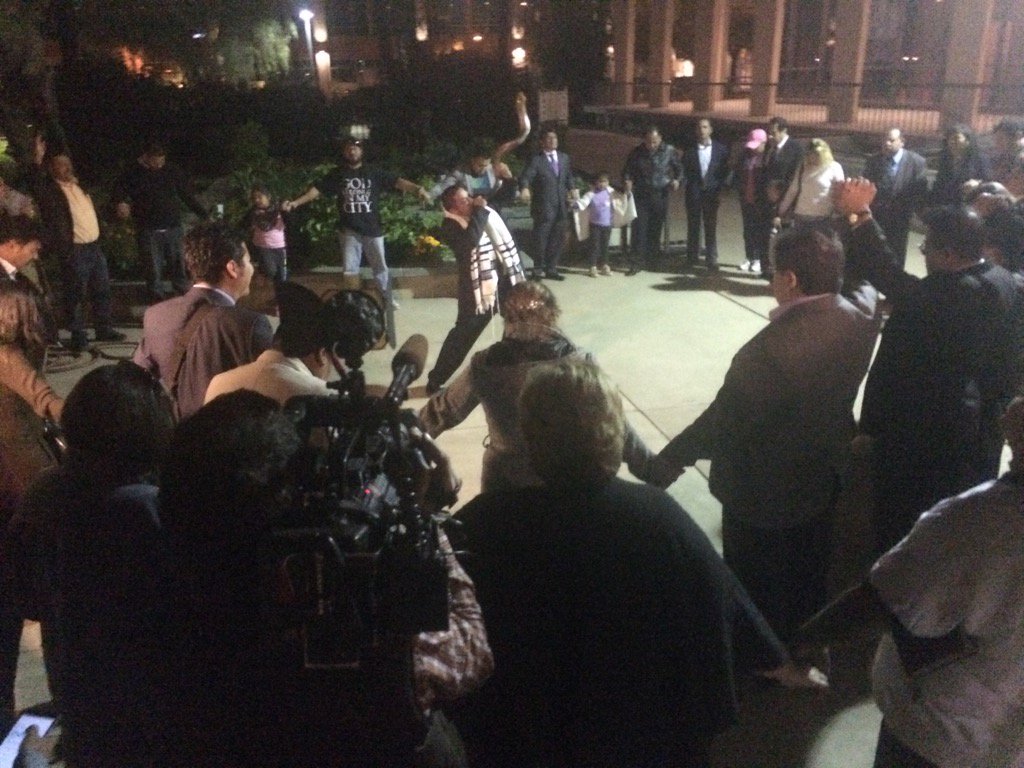
For weeks now, Phoenix lawmakers have wrestled with the idea of
allowing members of a Satanic group to give the invocation before an
upcoming city meeting. Phoenix City Council members arrived Wednesday at a controversial solution: Banning prayer altogether.
From
now on, lawmakers decided in a 5-4 vote, council meetings will no
longer begin with a traditional prayer, but instead open with a moment
of silence. Although the decision may block the Satanic Temple’s
Feb. 17 invocation, it prompted outcries from some Phoenix residents and
city officials who believe the prayer ban is a de facto victory for the
Satanists.
“This is what that Satanist group wants,” Councilman Sal DiCiccio told the Arizona Republic. “A moment of silence is basically a banning of prayer. It’s to agree to the Satanic goal to ban prayer.”
In a tweet, DiCiccio called it a “sad day for Phoenix.”
Phoenix Mayor Greg Stanton and four members of the council voted in
favor of the change and argued that an effort to silence particular
groups could land the city in an expensive legal battle.
“The
First Amendment to the Constitution is not ambiguous on this issue,”
Stanton said, according to the Republic. “Discriminating against faiths
would violate the oath that all of us on this dais took. I personally
take that very, very seriously.”
Gregory Lipper, a senior attorney at Americans United for Separation of Church and State, said the mayor’s prediction is sound. Lipper, who has represented the Satanic Temple in previous legal battles, said that two years ago, the Supreme Court held in Town of Greece v. Galloway that
a community’s practice of beginning legislative sessions with prayers
does not violate the First Amendment’s Establishment Clause.

However, Lipper said, while local governments can open meetings with
prayers, those governments cannot control the content of those prayers
unless they denigrate other faiths or include proselytizing. Much of the
resistance to the Satanic Temple, he said, comes from people who
believe the group is made up of devil worshipers, and they tend to
unleash fierce opposition that wouldn’t hold up in a court of law.
“This
is an issue that will come up in homogeneous communities when a member
of a minority religion takes advantage of the invocation and it tends to
generate a backlash,” Lipper told The Post. “Most local governments are
used to a steady drumbeat of Christian clergy delivering Christian
prayers. We’ve seen this same issue with Muslim prayer-givers and Wiccan
prayer-givers around the country.
“When they show up, all the sudden the practice generated a bunch of objections.”
Lipper said the Phoenix City Council made the right decision, but for “disturbing reasons.”
“They’re
saying, ‘we don’t like their prayers, so we’re going to shut the whole
thing down,'” he said. “It leaves a bad taste in the Satanist’s mouth.”
Contrary
to the name, Satanic Temple members are non-theists who do not believe
in the existence of the devil and promote the idea that religion can be
divorced from superstition. On its Web site, the Satanic Temple
describes its mission as encouraging “benevolence and empathy among all
people.” Among the group’s seven tenets: “The freedoms of others should be respected, including the freedom to offend.”
“Our
tenants are rational and we emphasize compassion,” Satanic Temple
founder Lucien Greaves told The Washington Post. “Satan to us is
metaphorical and represents a universal fight against tyranny and
autocracy.” The group has set off numerous headline-making
free-speech debates in recent years by using provocative imagery. In
2014, it unveiled a proposal to place a seven-foot Satanic statue in
front of the Oklahoma state capitol, next to a statue of the Ten
Commandments.
Later that year, after threatening a lawsuit, the
Satanic Temple — in conjunction with Americans United — convinced
Florida officials to allow the temple to move forward with a holiday
display in the state capitol in Tallahassee that showed an angel
dropping from the sky into a pit of flames. The week-long display, which
Florida officials had previously labeled “grossly offensive,” was
placed in an area designated as an open forum for private speech.
Greaves
said Thursday that the dispute with the Phoenix City Council began in
December, when a local member of the Satanic organization applied via
email to give the invocation before the governing body. Temple members,
he said, assumed they’d walk in, give the invocation and leave, with
their entire effort going mostly unnoticed.









0 comments:
Post a Comment